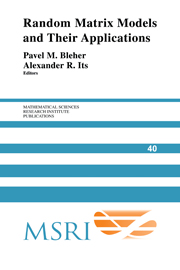Book contents
- Frontmatter
- Contents
- Preface
- Symmetrized Random Permutations
- Hankel Determinants as Fredholm Determinants
- Universality and Scaling of Zeros on Symplectic Manifolds
- z-Measures on Partitions, Robinson-Schensted-Knuth Correspondence, and β = 2 Random Matrix Ensembles
- Phase Transitions and Random Matrices
- Matrix Model Combinatorics: Applications to Folding and Coloring
- Interrelationships Between Orthogonal, Unitary and Symplectic Matrix Ensembles
- Dual Isomonodromic Tau Functions and Determinants of Integrable Fredholm Operators
- Functional Equations and Electrostatic Models for Orthogonal Polynomials
- Random Words, Toeplitz Determinants, and Integrable Systems I
- Random Permutations and the Discrete Bessel Kernel
- Solvable Matrix Models
- The τ-Function for Analytic Curves
- Integration over Angular Variables for Two Coupled Matrices
- Integrable Lattices: Random Matrices and Random Permutations
- SL(2) and z-Measures
- Some Matrix Integrals Related to Knots and Links
SL(2) and z-Measures
Published online by Cambridge University Press: 25 June 2025
- Frontmatter
- Contents
- Preface
- Symmetrized Random Permutations
- Hankel Determinants as Fredholm Determinants
- Universality and Scaling of Zeros on Symplectic Manifolds
- z-Measures on Partitions, Robinson-Schensted-Knuth Correspondence, and β = 2 Random Matrix Ensembles
- Phase Transitions and Random Matrices
- Matrix Model Combinatorics: Applications to Folding and Coloring
- Interrelationships Between Orthogonal, Unitary and Symplectic Matrix Ensembles
- Dual Isomonodromic Tau Functions and Determinants of Integrable Fredholm Operators
- Functional Equations and Electrostatic Models for Orthogonal Polynomials
- Random Words, Toeplitz Determinants, and Integrable Systems I
- Random Permutations and the Discrete Bessel Kernel
- Solvable Matrix Models
- The τ-Function for Analytic Curves
- Integration over Angular Variables for Two Coupled Matrices
- Integrable Lattices: Random Matrices and Random Permutations
- SL(2) and z-Measures
- Some Matrix Integrals Related to Knots and Links
Summary
We provide a representation-theoretic derivation of the determinantal formula of Borodin and Olshanski for the correlation functions of z-measures in terms of the hypergeometric kernel.
1. Introduction
This paper is about z-measures, a remarkable two-parameter family of measures on partitions introduced by S. Kerov, G. Olshanski and A. Vershik [Kerov et al. 1993] in the context of harmonic analysis on the infinite symmetric group. In a series of papers, A. Borodin and Olshanski obtained fundamental results on z-measures; see the survey [Borodin and Olshanski 2001] in this volume and also [Borodin and Olshanski 1998]. The culmination of this development is an exact determinantal formula for the correlation functions of the z-measures in terms of the hypergeometric kernel [Borodin and Olshanski 2000]. We mention [Borodin et al. 2000] as one of the applications of this formula. The main result of this paper is a representation-theoretic derivation of the formula of Borodin and Olshanski.
In the early days of z-measures, it was already noticed that they have some mysterious connection to the representation theory of SL(2). For example, a z-measure is in fact positive if its two parameters z and z’ are either complex conjugate z' = z or z,z' ∈ (n, n+1) for some n ∈ ℤ. In these cases z — z' is either imaginary or lies in (—1,1), which is reminiscent of the principal and complementary series of representations of SL(2).
Later, Kerov (private communication) constructed an SL(2)-action on partitions for which the z-measures are certain matrix elements.
Information
- Type
- Chapter
- Information
- Random Matrix Models and their Applications , pp. 407 - 420Publisher: Cambridge University PressPrint publication year: 2001
Accessibility standard: Unknown
Why this information is here
This section outlines the accessibility features of this content - including support for screen readers, full keyboard navigation and high-contrast display options. This may not be relevant for you.Accessibility Information
- 2
- Cited by
